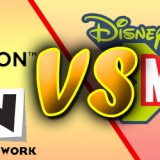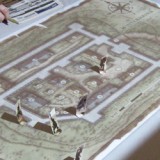Puzzle Quest: Galactrix: DS Review
A couple of weeks ago the highly anticipated sequel to Puzzle Quest: Challenge of the Warlords was released. D3 gave the game a complete overhaul, changing from fantasy RPG and venturing into space to produce Puzzle Quest: Galactrix. After playing on the Nintendo DS, I learned that the changes, while often not for the best, offer a new and equally addictive game.
At its core, this is the same Puzzle Quest we have grown to love. Your character travels around a map, completes missions, buys items, and of course, fights enemies. Right off the bat, one of the major differences is there are no character classes. Gone are the fighters and wizards, replaced instead by the simple choice of male or female. Instead, your ship is customizable with various abilities and weapons. While this makes perfect sense thematically, it does hinder the replay-ability somewhat. Graphically, the game is simple, but pleasing. The music (while often copying from the original Battlestar Galactica), is non-obtrusive, but sadly gone is the “you are victorious!” announcement after a win.
Galactrix offers a story mode similar to the original. As you encounter new factions, you perform various side missions while tracking down violent “soulless” clones created by human scientists. These clones, hell-bent on destroying the universe, are apparently led by a floating figure who is a cross between Jesus and Leonardo da Vinci’s “Vitruvian Man.” During various cut-scenes, this figure spouts pointless preachy diatribes which are nothing special, but at least move the game along.
The biggest difference comes in the game board. Replacing the traditional Bejeweled format, is a hexagonal board with hexagonal items. Like the original, you match various colors which fill up power meters, collect experience or damage opponents. The new format takes a while to get used to. Instead of tiles filling in from the top, they come from which ever direction the match was made. It might sound confusing, but after those first few plays, it’s fairly easy to figure out.
One innovative feature is the inclusion of both health points and shield points for your ship. Shields are regenerated by matching blue tiles, while health points can only be raised by a few rare powers. You must bring your opponent’s shields to zero, before their health can be hit. Early in the game, when ships are weak, battles tend last a painfully long time as shields regenerate faster than damage can be doled out. As your ship becomes more powerful, however, shield management becomes an integral part of game play and can be the difference between a close win or loss.
The original Puzzle Quest had a fair amount of luck, but skill played a large factor – particularly in the mini-games. This new version unfortunately feels overwhelmingly luck-based. The board often changes drastically on a single turn, and you can find yourself hurting your opponent (or being hurt yourself) for an absurdly high number of points. As such, prepare for situations where you are handily winning and suddenly the game is over before you get a chance to react.
The mini-games take luck to an even greater extreme. First off, and the bane of your existence, is Leap Gate Hacking. Moving your ship between planetary systems requires a Leap Gate between the two to be opened. This is a mini-game in which you have to match a certain number of colors in a specific order before time runs out. While there is a bit of skill attributed to the speed in which you find matches, the results are simply based on which tiles you are given. I’ve routinely failed only to beat it on my second try with most of my time left. This makes it far too unbalanced, especially since you find yourself hacking leap gates more often than anything else in the game. And, even more annoyingly, once opened, leap gates tend to close over time.
The other mini games (Mining, Crafting, Haggling and Rumors), are all variants on the standard game board. They require you to match certain colors or objects in certain ways. The most interesting, “Haggling,” has you attempting to clear as many tiles off a board as you can before there are no more moves. The more you clear, the better your discount is at a given store. It’s one of the few that actually feels like a puzzle. On the other end of the spectrum is “rumors,” where you simply need to match all but one kind of tile. Not only have I yet to lose this mini-game, I also have yet to figure out what the point of discovering rumors is.
While having a large number of mini-games is nice, they seem to take a more integral role in gameplay than the original. You’ll find yourself playing mini-games more often than battling. Unfortunately battles tend to be few and far between. Even more frustrating is that most missions simply have you flying between planets doing nothing more than clicking on them for information. All the skill this requires is touching a spot on the map and opening leap gates. It quickly becomes both tedious and boring.
In the original DS game, the controls felt made for the system. Sure, there were glitches here and there, but they were few and far between. In Galactrix, the glitches are prominent. The most glaring occurs on the map screen. Selecting a planet causes a list of options to pop up that can be selected with your stylus. Usually, you miss entirely, even if it seems the word was tapped dead on. In that case your ship flies away for no apparent reason and must be steered back to the planet to try again. Sometimes you happen to select something you didn’t want, instead. Then you have to wait through an incredibly long load screen, exit out of the new menu, wait another long time for the game to save, and try again. During that time, you could be fighting an ogre in the original Puzzle Quest. Not likely a factor on non-stylus based platforms, but on the DS it’s frustrating – to the point of making you want to chuck your system across the room.
Despite its flaws, Puzzle Quest: Galactrix offers some innovative twists. It pales in comparison on almost every level from the original and suffers from being too luck dependent, but at the same time, it’s equally addicting. Perhaps it’s the semi-mindless puzzles, or perhaps it’s the need to learn what missions come next. Either way, you’ll find yourself playing deep into the night, at least until you can no longer bear the stylus-holding cramps in your wrist.
















